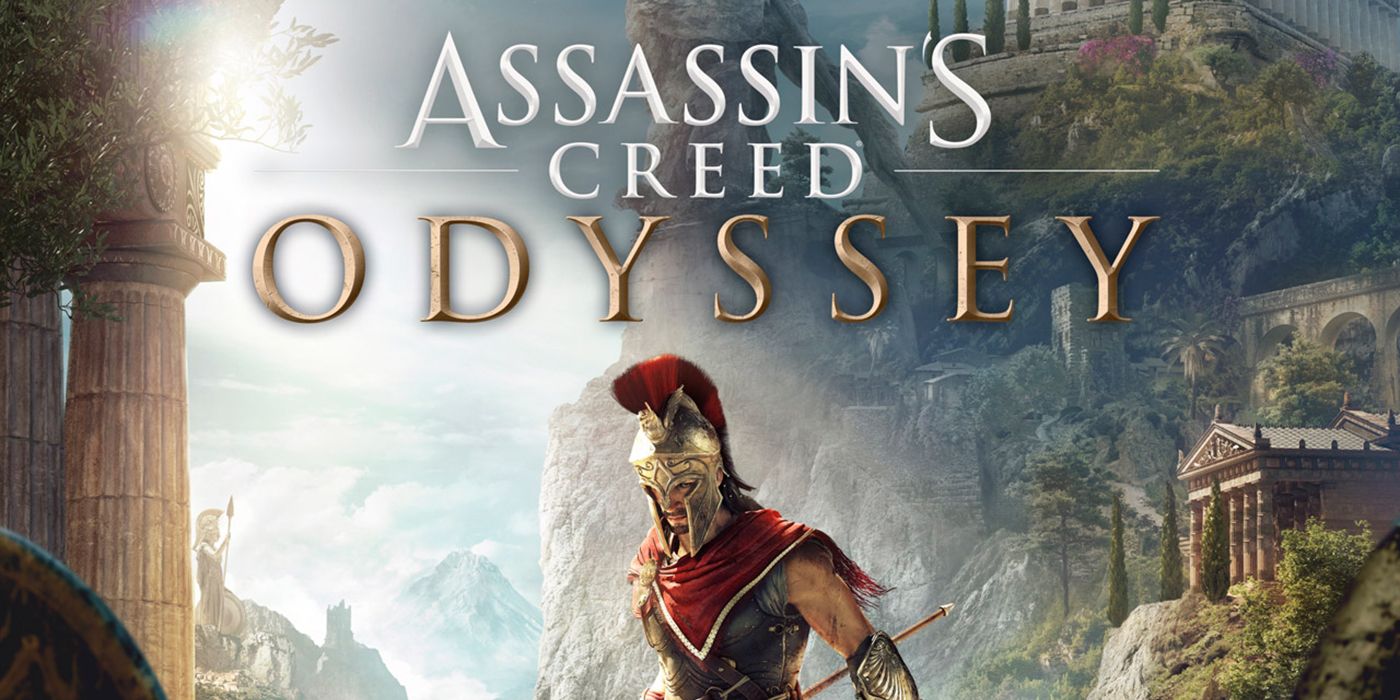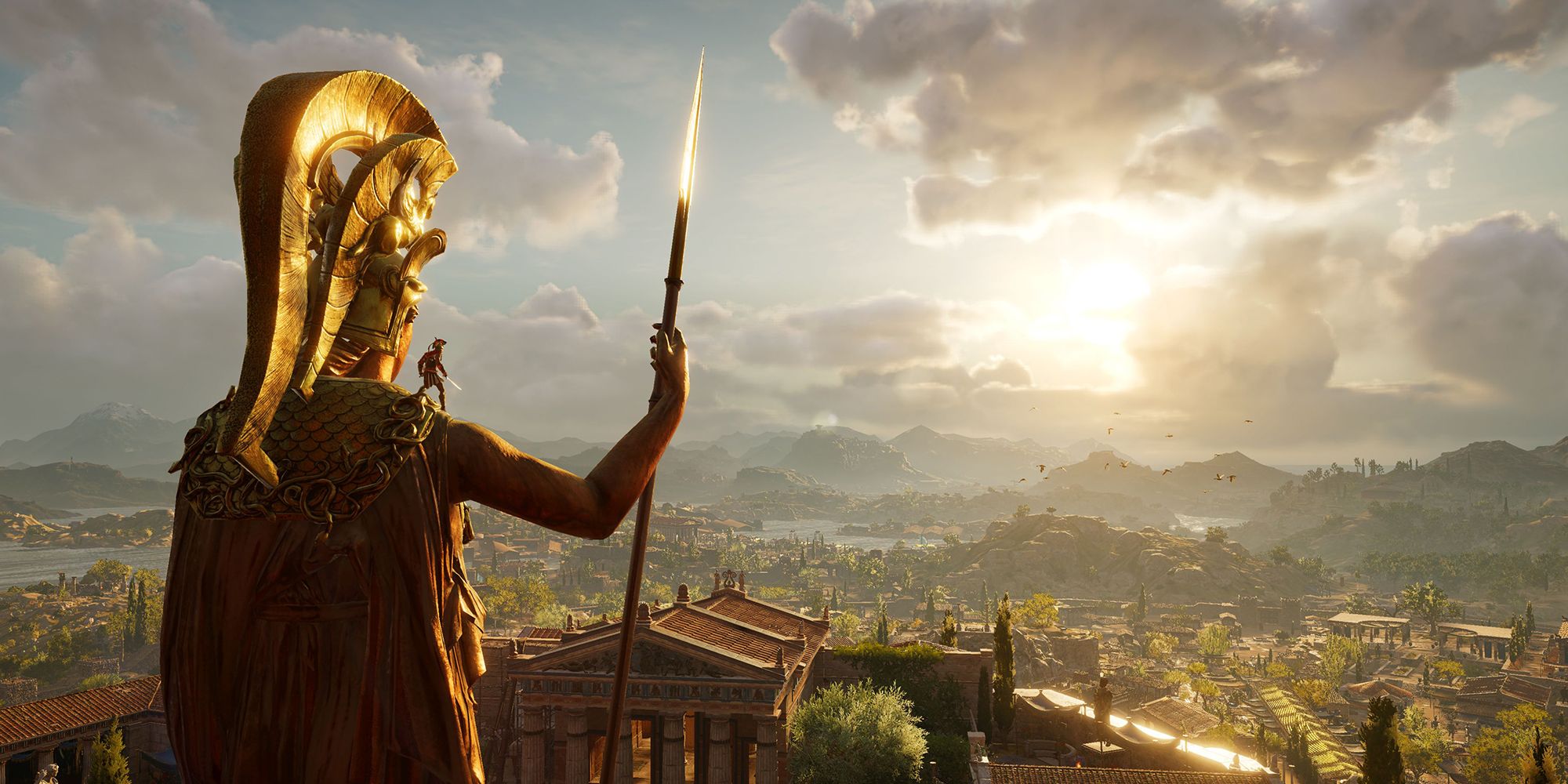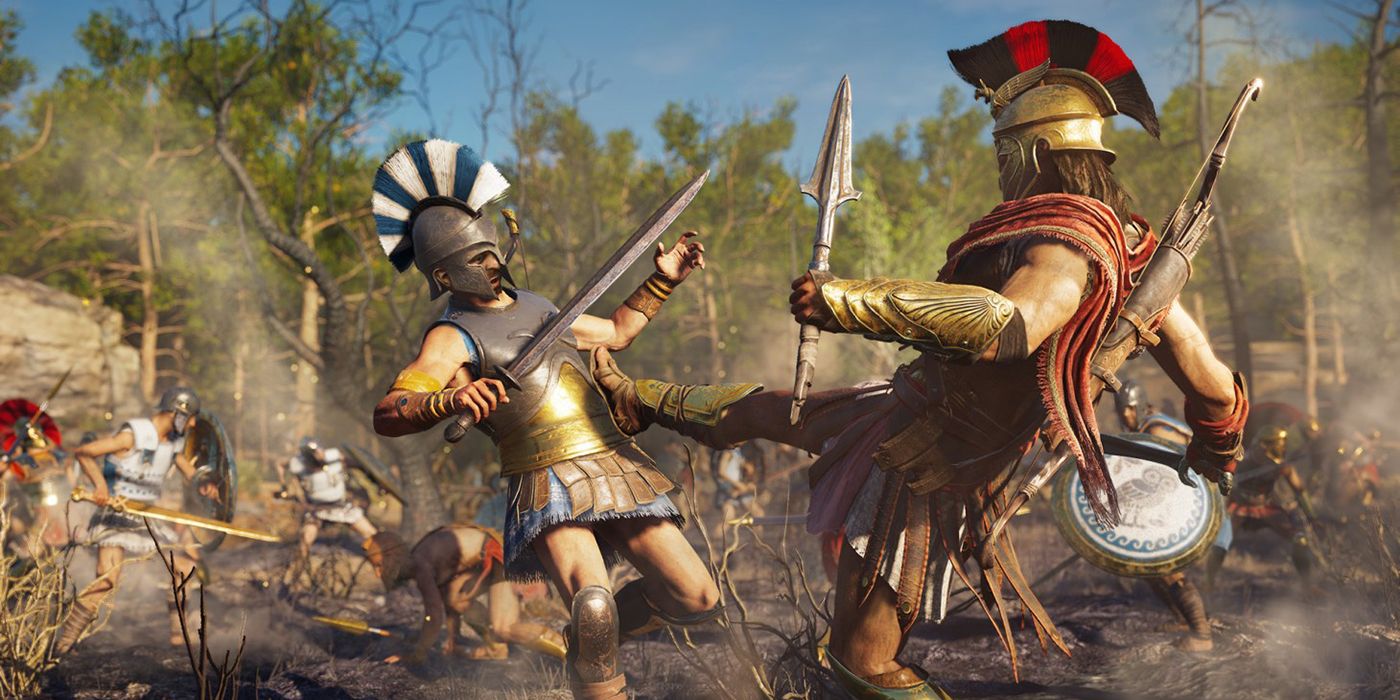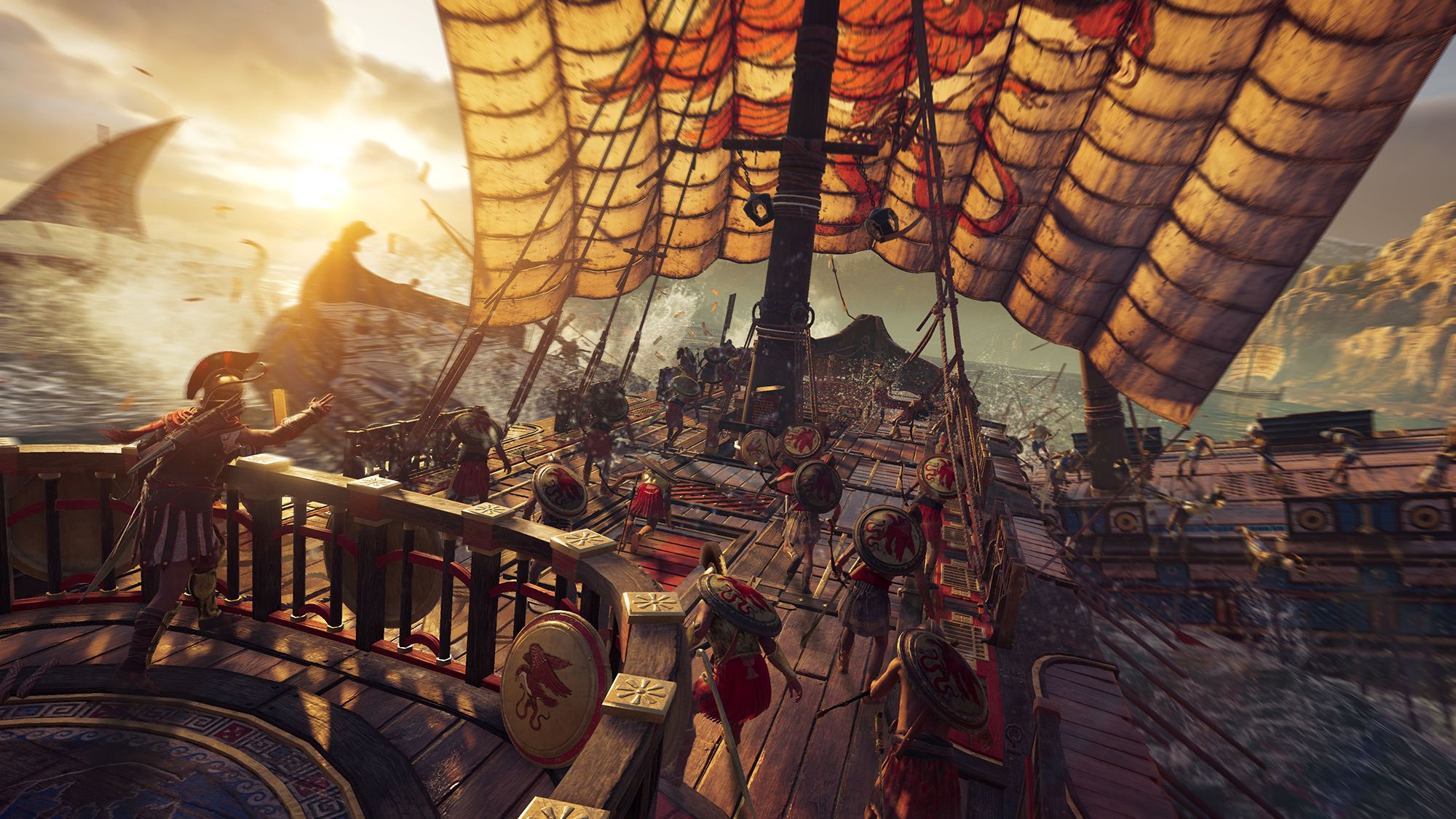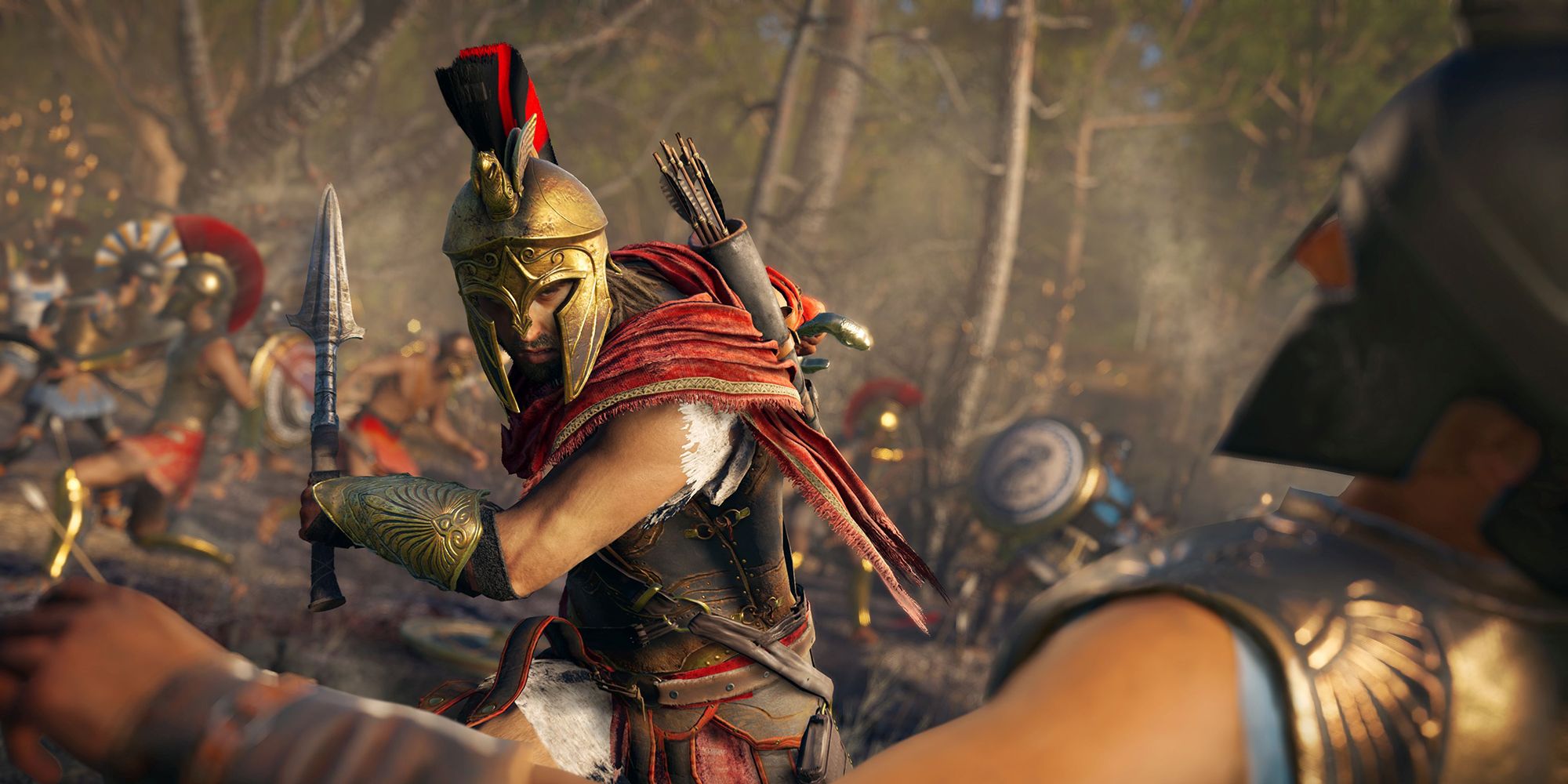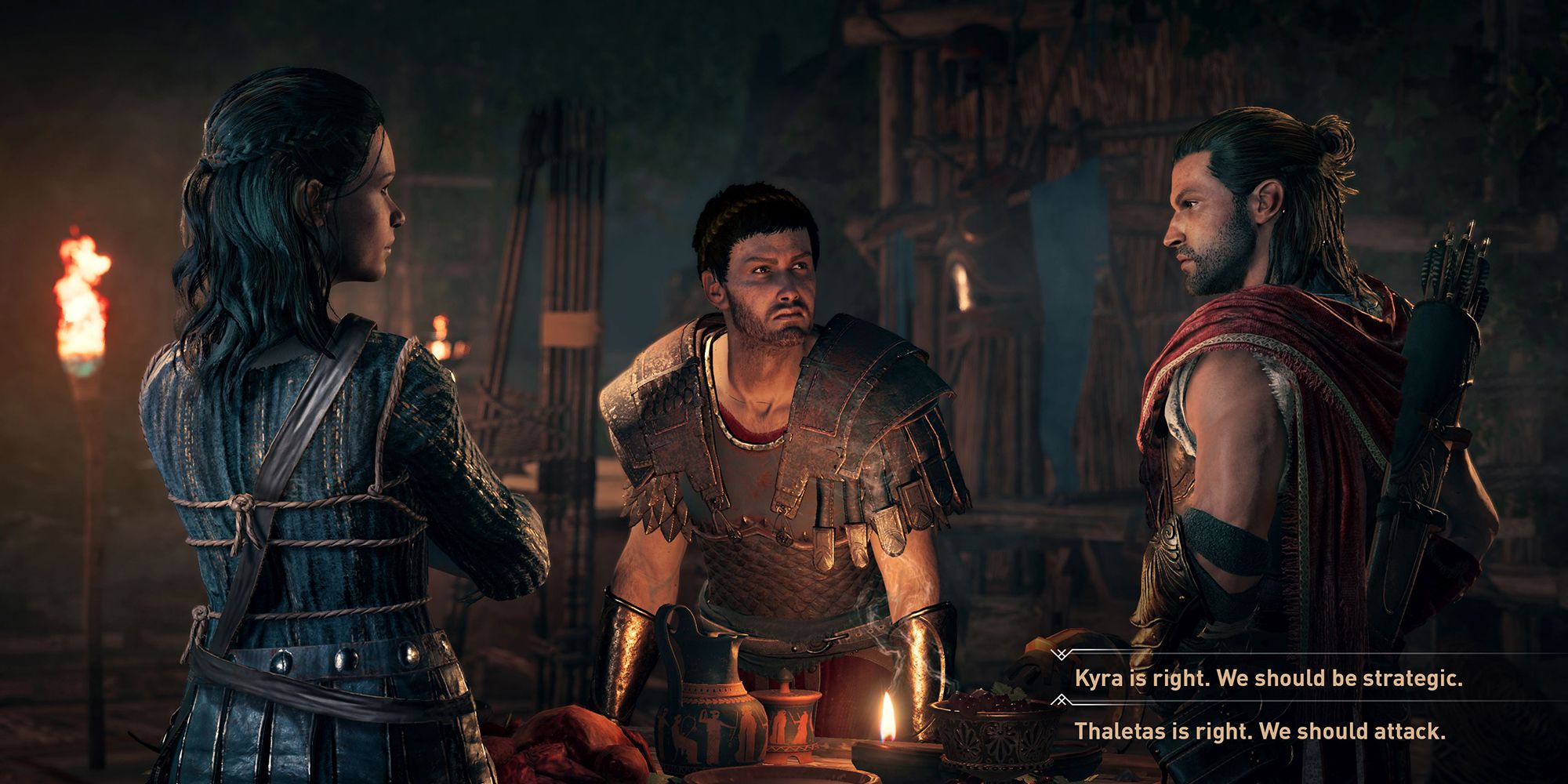Following on from its failed look at the French revolution in Assassin's Creed Unity, the Assassin's Creed franchise has been going through a revolution of its own. Assassin's Creed Syndicate made some slight tweaks to the formula and provided a more robust and impressive adventure, before 2017's Assassin's Creed Origins gave the series a much-needed overhaul. Built on the back of this work is Assassin's Creed Odyssey, which is perhaps the most enjoyable game in the franchise for some time.
Odyssey builds upon what worked so well in Origins with glee, without making major changes to this new Assassin's Creed formula but instead honing those core gameplay mechanics and making some worthwhile additions to the overall experience. It's a bolder game than the last iteration, expecting players to accept a new normal and provide a wealth of new distractions in its large, open world.
Related: Assassin's Creed Odyssey Trailer is The 300 Game We Always Wanted
The world itself is a gorgeous one at that. Assassin's Creed Odyssey's world map is bigger than what Origins provided, but much more important than that is the level of variation that this one offers up. It's a game full of lush forests, clear Mediterranean waters, volcanic islands and salt plains, and Ubisoft has certainly managed to capture that essence of the adventure of the Greek myth.
There's a great deal of care that has been taken to provide players with a Classical Greece that they will recognize. Exploring areas like Athens is a joy, giving would-be Greek heroes the opportunity to go on a digital sightseeing tour that has become an expectation of the series as a whole. Along the way, they will meet a veritable army of historic figures, an Assassin's Creed gimmick that always breaks the immersion but is still fairly enjoyable with a nod and a wink.
It's not just geographical variety that's a treat for players, either, as Assassin's Creed Odyssey also provides plenty of room to take part in different quest-lines and side missions. It's a Greece in an era of turmoil, with the bitter Peloponnesian War between Athens and Sparta engulfing the region, bringing with it opportunities for unscrupulous sorts such as bandits and pirates - as well as other enemies.
Although there is a larger story to be told, it's here that the bulk of player engagement lies. Assassin's Creed Odyssey embraces an open world action RPG focus that suits it well, perhaps even feeling closer in feel to Horizon: Zero Dawn than early entries in the series. As a mercenary, the player can traverse Classical Greece solving problems for a price, a hired hand with a deft touch for stealth and assassination over brute force - although the option is always there whether a large Spartan fort or hidden cultist cavern, with a greater level of fluidity than has been seen in previous titles.
Under an older system in Assassin's Creed, this could have become stale quite quickly, jumping from map point to map point without giving much credence to the specifics of any job. However, Odyssey introduces a much-needed Exploration Mode, which puts the onus on the player to piece together information about a quest to find exactly where to look for the correct bandits to kill or mythic beast to slay. In short, this means asking questions and scouting out potential sites to complete missions, and this simple change really ups the feeling of engagement.
In a way, it makes Assassin's Creed Odyssey much more of a virtual playground than its predecessors, moving steadily away from the heaviness of previous games and instead straying into a mode of play reminiscent of the brilliant Breath of the Wild or even Skyrim. It might frustrate some long-term fans after something a little more traditional, but overall it's a very captivating way to play. It's not perfect by any means, but it's a big improvement on the box-ticking exercise that the series could sometimes become.
That's not the only similarity to Skyrim either, as there's also a larger faction war taking place across the map. With Athens and Sparta in a full-on conflict, players are given the option to undermine each region of the map to try and install a new leadership in place. This is done through killing off current leaders, destroying vital supplies or raiding forts, culminating in a large-scale battle and therefore a neat distraction from the main story at times.
Page 2: The Story and Our Review Score of Assassin's Creed Odyssey
Nonetheless, there is a central arc here, and it's one that feels a little more emotionally investing than the usual Assassin's Creed tale. The larger lore, although covered, is put on the back-burner once more with an emphasis instead on a tale of family prophecy. It's a personal story that ties into the larger plot as a whole, and this combination actually makes it feel closer to the tone of a Greek myth that Ubisoft has tried to emulate.
Although this story is perhaps nothing particularly groundbreaking, particularly when trying to tie together those ever-stretching strands of the Assassin's Creed universe together in an impactful way, it's helped by the fact that the game's main character is a charismatic one. Whether choosing to play as Alexios or Kassandra, the player will be rewarded with roguish charm that gives the game much more personality than the more po-faced and grim story of Bayek in Origins.
There is something of a friction here, however, and it's one that comes from this attempt to merge a more expansive, open style with a long-running series with certain expectations to uphold. At times it feels as though the Assassin's Creed name is even holding back Odyssey from becoming something more of its own, particularly given that it feels so different from the Assassin's Creed games of old.
That said, there are elements that will feel reminiscent. From a gameplay point of view, the return of seafaring is very welcome, particularly given how well regarded Assassin's Creed IV: Black Flag is to this day. Meanwhile, the way that Odyssey pulls in the core plot points of the First Civilization is more careful than in previous games, which makes the overall split between the intricacies of Classical Greece and the background machinations of Abstergo Industries in the modern day less jarring.
Beyond that, the improvements made with elements that played a part of Assassin's Creed Origins are also expertly handled. Chief among these is the Bounty Hunter system, which works similarly to the Phylakes mini-bosses in Origins that are activated when the player is caught behaving badly. With the player tied into the larger mercenary rankings, it gives the whole mechanic a feeling of familiarity and makes the world feel that little bit more real, particularly when seeing one of the roaming mercenaries while exploring.
It's just one example of how Odyssey feels authentic as a living world, with another being the larger conspiracy at large. Rather than simply tying this into fixed missions, instead the player is given the chance to hunt down this hidden enemy themselves, unravelling clues that give hints at where to look next. At times the facade of absolute control from the player still drops, but even so it's done well enough to leave a strong impression.
This is equally true when it comes to player dialogue options. Throughout the game, the hero is able to choose from different options at opportune moments, including such important aspects as killing or sparing major characters. This results in several ending options available to players, and although it's perhaps a more rigid system than it initially feels it adds up to the game's open world actually feeling open, rather than the hidden, on-rails sensibilities of prior Assassin's Creed games.
All that leaves Assassin's Creed Odyssey in a very strong position. Its improvements on Origins are obvious, doubling down on what worked and making movements forward in its own right. It's this increased flexibility that really works best, with more emphasis on player authority from both a gameplay and story perspective.
There may still be some questions about exactly how well this larger map and open ideology works with what Assassin's Creed is meant to be, but overall Assassin's Creed Odyssey is an excellent next part of the series. With some of the best combat in the franchise to date and a fantastic world to be lost in, Odyssey is a full and vibrant experience for any action RPG fan to enjoy. It's certainly enough to stop fans from wondering what to do with no new Assassin's Creed game in 2019.
More: 10 Cities Assassin's Creed Needs (And 10 That Should Be Avoided)
Assassin's Creed Odyssey releases October 5 for PC, PS4, and Xbox One. Screen Rant was provided with a PS4 code for the purposes of this review.

